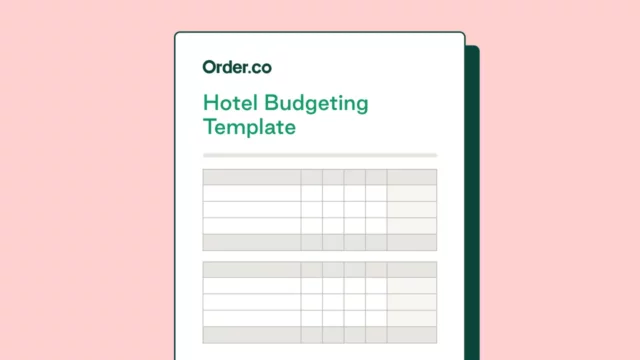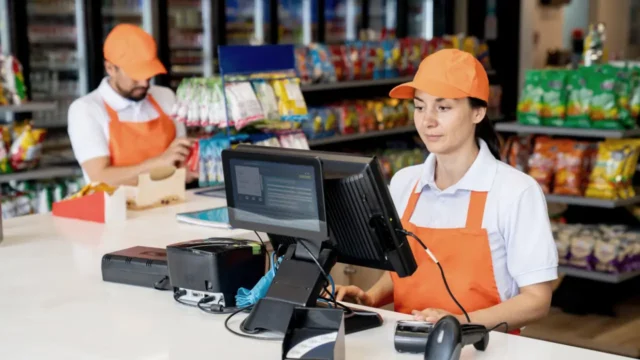Better Hospitality Procurement: Best Practices & Processes

Better Hospitality Procurement: Best Practices & Processes
Hospitality sector and service-based businesses are fast-paced, high-volume operations with historically tight profit margins. To succeed in a hospitality business, owners and finance teams must closely monitor the bottom line. Procurement is one of the primary areas where businesses can realize savings and optimize operations.
Today we’ll share information buyers need to know when purchasing for a hospitality business:
- What is hospitality procurement?
- What are the common challenges in hospitality procurement?
- What are the benefits of using hospitality procurement software?
Summary:
- Strategic hospitality procurement maximizes margins through cost control, waste reduction, and consistent quality.
- Centralized procurement solutions simplify ordering, vendor management, and approvals for multi-location hospitality organizations.
- Proactive spend planning and adaptable supplier relationships help hotels and restaurants manage price fluctuations and supply chain risks.
- Enforcing purchasing policies and leveraging automation ensures spending stays on budget, supporting long-term financial health.
Download the free tool: Hotel Budgeting Template
What is hospitality procurement?
Hospitality procurement is the practice of sourcing and purchasing goods and services required by a hotel, restaurant, resort, or other hospitality-based venue.
Hospitality buyers perform many of the standard activities of procurement, such as:
- Sourcing vendors to find the most suitable products at competitive prices
- Negotiating and managing contracts with suppliers
- Tracking inventory levels to maintain adequate stock between replenishment
- Managing orders, invoices, payments, and return activities
- Tracking spend and benchmarking prices to maintain competitive rates
Though hospitality shares many traits with general procurement, there are a few characteristics that set it apart from procurement in other industries.
Hospitality procurement process
From sourcing linens to restocking kitchen supplies, procurement teams in the hospitality industry must manage a range of purchases that can directly impact guest satisfaction and profitability. Following a consistent workflow will help employees avoid missing any critical steps that could lead to late deliveries, rogue purchases, or overspending on products.
Here’s how the hospitality procurement process works:
- Identify operational needs: Teams assess needs across departments or properties to determine what supplies or services are required.
- Source vendors: Buyers compare suppliers based on cost, reliability, delivery time, and quality.
- Submit purchase requisitions: Team members create and send requests for the goods or services they need.
- Create and issue purchase orders: Once requests are approved, buyers generate a PO including item details, quantities, and pricing.
- Receive and inspect deliveries: Staff accept deliveries and review their contents to ensure they match the associated PO(s) before stocking them in rooms.
- Match invoices and process payments: The AP team checks the invoice, matches it to the PO and delivery receipt, and then schedules a payment.
- Track spend and analyze performance: Finance and operations teams use software to track purchasing trends, manage vendor relationships, and look for cost-saving opportunities.
When rooms are fully stocked with everything they need, guests can relax and enjoy their stay rather than tracking down missing items. And with the right tools in place – like procurement automation software – teams gain greater control and free up their time to prioritize delivering exceptional guest experiences.
Common hospitality procurement challenges
Hospitality businesses often have specific needs for procurement management. They run on smaller profit margins — with restaurants as low as 3 to 5 percent and hotels a surprising negative 2 percent before depreciation — and thus need competitive pricing on supplies and consumables. The ability to control costs and inventory levels ties directly to healthy cash flow and cost-effective operations.
Cost increases: Purchase price variance in the hospitality industry can be a major challenge since cash flow and budgets are usually tight. Price increases directly impact a business's purchasing power, and cost inflation can make it difficult for hospitality businesses to maintain their competitive advantage. Rising prices can result in decreased profits for businesses, as they must pass on the increased cost to consumers, which sometimes means fewer sales.
To stay ahead of the competition, the hotel industry and other hospitality-based businesses must anticipate price increases and find ways to adjust their procurement processes accordingly. Trend analysis and technology help businesses identify suppliers that offer competitive prices and payment terms.
Supply chain constraints: The global hospitality industry relies heavily on its network of suppliers for goods and services. In the recent climate of strained supply chains and shortages, hospitality is feeling the crunch. If a supplier runs into difficulty or disruptions to their operations, the entire industry feels the impact. It can cause shortages and quality control issues that decrease customer satisfaction and impact revenue.
Product consistency: In the hospitality industry, consistent guest experience is essential for delivering quality service. Businesses must meet customer expectations every time they visit, whether for food, accommodations, treatments, or other services. With consistent product standards, customers enjoy and share these experiences — ideally becoming evangelists for the brand.
Businesses need a balance of quality control and flexibility, allowing them to quickly switch between suppliers if needed. With the right planning and foresight, hospitality businesses can ensure product consistency even when faced with supply chain impediments.
Maverick spending: Also called “rogue” or “shadow” spend, maverick buying occurs when individual employees or locations purchase goods and services outside the formal procurement process. It usually happens when employees try to save time by avoiding approval delays or if they believe they can get a better price. Maverick spending occurs due to insufficient knowledge, a sense of urgency, or a lack of policy or enforcement. It can lead to financial losses and damage a business's reputation if not managed properly.
Spend planning: Budgets are important in every business but are especially imperative for meeting the tight margins of service businesses. Hotels, spas, and restaurants constantly monitor their stock of on-hand resources to meet customer needs without waste or overspending. Estimating expected demand helps businesses plan purchases and stay on top of potential supply chain disruptions.
Through spend planning, hospitality businesses can also track expenses more accurately to determine opportunities for cost savings. With a comprehensive view of their spending, hospitality businesses optimize their budgets more effectively and ensure supplier relationships remain competitive.
Best practices for managing hospitality procurement
Managing procurement across multiple locations can be complex—from creating purchase orders to managing budgets and tracking deliveries. Procurement software solutions can help simplify these processes by centralizing information, improving visibility, and reducing manual tasks.
Here are a few ways hospitality teams are using procurement tools to improve day-to-day purchasing:
Purchase order creation: Creating and routing purchase orders doesn’t need to be time-consuming. Centralized procurement platforms allow teams to build, approve, and track POs in one place. Automation features help reduce errors and provide a clear record of each step, from submission to delivery.
Need a quick way to build your next purchase order? Use this free purchase order template to get started.
Vendor management: Maintaining multiple vendor relationships is easier when all vendor data lives in one place. Many teams create a curated catalog of preferred vendors within their procurement tool, making it faster to find items that meet their price, quality, and delivery requirements.
Simplified ordering: Hospitality operators benefit from tools that make it easy to reorder frequently used items, replace out-of-stock goods, and keep purchases aligned with brand standards. Look for systems that support order guidelines and spend thresholds by location or department.
Maverick spend control: Unapproved purchases can quickly eat into budgets. A procurement platform can help enforce purchasing policies with built-in controls, such as role-based permissions, spend caps, and category-level restrictions. These tools help keep spend predictable and within budget, while avoiding cash leaks.
Automated approvals: Manual approvals often slow down purchasing. Automated approval workflows route requests to the right stakeholders and make it easier for buyers to track progress. This reduces bottlenecks and gives teams more time to focus on guest experiences.
AP automation: Accounts payable teams play a critical role in procurement. When systems are connected, AP teams can match invoices to POs, automate data entry, and reduce the time spent reconciling purchases. This ensures accuracy and frees up time for higher-value work.
Integrated payments: Integrated payment solutions enable faster, more accurate processing. Electronic payment options and features like automatic GL coding and invoice consolidation can simplify workflows and reduce manual effort across finance teams.
How Order.co makes hospitality procurement easier
As businesses like hotels and restaurants grow, their ordering and operations become more complex. While many service industry companies don’t have a dedicated procurement team to manage the many facets of hospitality purchasing, software can meet their needs and provide excellent cost efficiency to enable growth.
Order.co solves many hospitality buying challenges with innovative features, such as:
- AP automation to streamline how buyers procure and pay for the goods they need
- Access to preferred buyers and flexible spend controls to ensure locations get the right items and pricing
- Funding options through Order.co financial offerings that build the cash flow flexibility to grow efficiently and maintain stability during turbulent times
FAQs
Get started
Schedule a demo to see how Order.co can simplify buying for your business.
"*" indicates required fields



